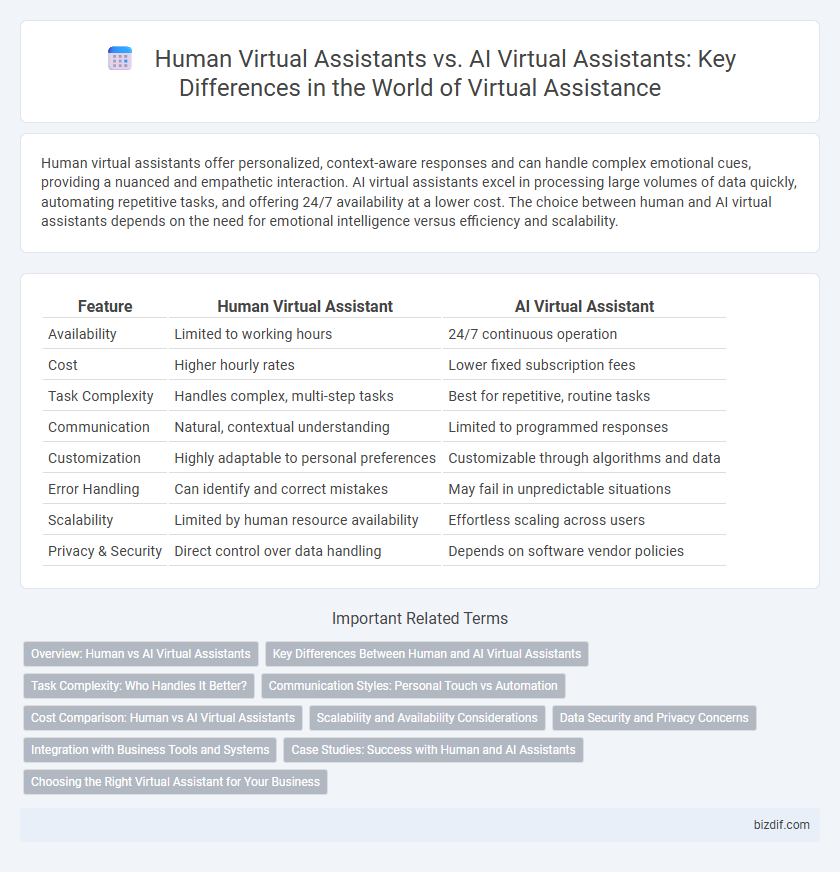Human virtual assistants offer personalized, context-aware responses and can handle complex emotional cues, providing a nuanced and empathetic interaction. AI virtual assistants excel in processing large volumes of data quickly, automating repetitive tasks, and offering 24/7 availability at a lower cost. The choice between human and AI virtual assistants depends on the need for emotional intelligence versus efficiency and scalability.
Table of Comparison
| Feature | Human Virtual Assistant | AI Virtual Assistant |
|---|---|---|
| Availability | Limited to working hours | 24/7 continuous operation |
| Cost | Higher hourly rates | Lower fixed subscription fees |
| Task Complexity | Handles complex, multi-step tasks | Best for repetitive, routine tasks |
| Communication | Natural, contextual understanding | Limited to programmed responses |
| Customization | Highly adaptable to personal preferences | Customizable through algorithms and data |
| Error Handling | Can identify and correct mistakes | May fail in unpredictable situations |
| Scalability | Limited by human resource availability | Effortless scaling across users |
| Privacy & Security | Direct control over data handling | Depends on software vendor policies |
Overview: Human vs AI Virtual Assistants
Human virtual assistants provide personalized, context-aware support by understanding nuanced communication and complex tasks, leveraging empathy and critical thinking. AI virtual assistants specialize in rapid data processing, automation, and 24/7 availability, efficiently handling repetitive queries and routine tasks through machine learning algorithms. Choosing between human and AI virtual assistants depends on requirements for emotional intelligence, scalability, and task complexity in business or personal scenarios.
Key Differences Between Human and AI Virtual Assistants
Human virtual assistants excel in personalized communication, emotional intelligence, and handling complex, context-specific tasks, offering adaptability in unpredictable scenarios. AI virtual assistants provide rapid, 24/7 task automation, data processing, and consistent performance through machine learning algorithms, optimizing efficiency for routine activities. The key differences lie in emotional understanding, decision-making complexity, and scalability, with humans better at nuanced interactions and AI excelling in high-volume, repetitive tasks.
Task Complexity: Who Handles It Better?
Human virtual assistants excel at managing complex, nuanced tasks requiring emotional intelligence, critical thinking, and creative problem-solving, while AI virtual assistants efficiently handle repetitive, data-driven tasks with speed and accuracy. Complex scenarios involving unpredictable variables or personalized responses benefit from human judgment and adaptability, whereas AI thrives in well-defined environments with structured workflows. Combining both human expertise and AI capabilities often yields the best outcomes for optimizing productivity and service quality.
Communication Styles: Personal Touch vs Automation
Human virtual assistants excel in delivering personalized communication with empathy, adapting their tone and responses to individual client needs, which enhances user satisfaction and trust. AI virtual assistants rely on automated, data-driven interactions that prioritize efficiency and consistency, though they may lack nuanced emotional understanding. The balance between personal touch and automation depends on the complexity of tasks and user preference for either human empathy or rapid, scalable responses.
Cost Comparison: Human vs AI Virtual Assistants
Human virtual assistants typically demand higher hourly rates ranging from $15 to $50, influenced by expertise and location, while AI virtual assistants operate with fixed software subscription fees averaging between $20 and $100 per month. Labor costs such as training, onboarding, and benefits significantly increase expenses when employing human assistants, in contrast to AI where these costs are negligible. Scalability favors AI virtual assistants due to predictable pricing and the ability to manage multiple tasks simultaneously without additional labor costs.
Scalability and Availability Considerations
Human virtual assistants provide personalized service and adaptability but face limitations in scalability and availability due to working hours and workload capacity. AI virtual assistants offer continuous 24/7 availability and can handle a vast number of simultaneous tasks, making them highly scalable for businesses with fluctuating demand. The integration of AI with human support optimizes both scalability and personalized customer experience.
Data Security and Privacy Concerns
Human virtual assistants provide personalized handling of sensitive information, but they pose higher risks of data breaches due to potential human error or insider threats. AI virtual assistants utilize advanced encryption and anonymization techniques to safeguard data, yet they raise privacy concerns related to algorithmic transparency and data storage practices. Balancing the efficiency of AI with strict compliance to data protection regulations is crucial for optimizing security and privacy in virtual assistant services.
Integration with Business Tools and Systems
Human virtual assistants excel in personalized integration with complex business tools, adapting quickly to unique workflows and providing nuanced responses based on contextual understanding. AI virtual assistants offer seamless connectivity with numerous software platforms through APIs, enabling real-time data synchronization, task automation, and 24/7 availability without human intervention. Combining human insight with AI-driven efficiency enhances overall operational productivity and ensures smooth integration across business systems.
Case Studies: Success with Human and AI Assistants
Case studies reveal that human virtual assistants excel in managing complex, nuanced tasks requiring empathy and judgment, such as personalized customer support for high-end services, resulting in increased client satisfaction by 30%. AI virtual assistants demonstrate superior efficiency in handling repetitive, data-heavy operations like appointment scheduling and information retrieval, reducing operational costs by up to 40% in enterprises. Hybrid models combining human insight with AI speed have shown a 25% improvement in overall productivity and enhanced customer experience in sectors like healthcare and finance.
Choosing the Right Virtual Assistant for Your Business
Selecting the right virtual assistant for your business depends on task complexity and budget considerations. Human virtual assistants excel in handling nuanced communications and personalized customer service, offering empathy and adaptability. AI virtual assistants provide cost-effective, scalable solutions for routine queries and data management, enhancing efficiency through automation and 24/7 availability.
Human virtual assistant vs AI virtual assistant Infographic

 bizdif.com
bizdif.com